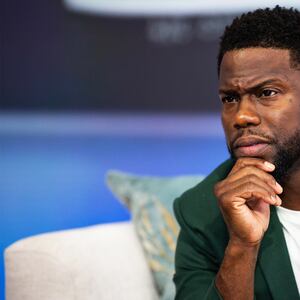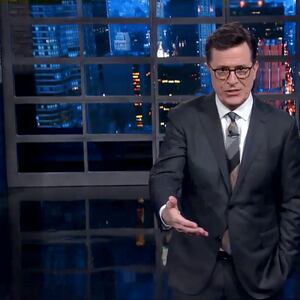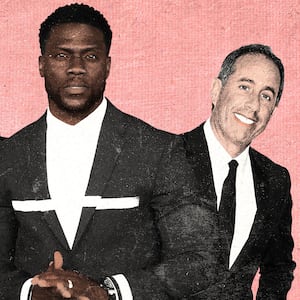After comedian Kevin Hart spent nearly 10 minutes dodging questions about his history of homophobic jokes and lame attempts at apology on Good Morning America Wednesday morning, Stephen Colbert knew he would have a difficult job ahead of him Wednesday night.
On GMA, Hart repeatedly said things like, “I’m over it” and “You will not hear me say anything else about it.” But as much as he may have wanted The Late Show host to keep his questions solely about his new movie The Upside, that just wasn’t going to happen.
Hart stalled with shtick at the top of the interview for as long as he could but eventually Colbert got down to business. “You have been in the news lately,” the host said as Hart tried to laugh off his current predicament. After acknowledging that Hart has said he doesn’t want to talk about it anymore, he asked, “Anything else you want to say about it?”
“I don't have anything else left to say,” Hart replied.
Instead of eliciting the same “polite” answers from his guest, Colbert tried some other tacks. When he asked Hart if he would have handled anything differently if could go back and do it again, Hart said, “No, I wouldn’t change anything.”
“Really?” Colbert asked. “Really? Because you didn’t apologize at first and then later you apologized.”
“I, right now, this is me, I’m over it,” Hart said, repeating his new favorite phrase. Comparing himself to an onion with infinite layers, he said, “I apologized, apologized again, I said I apologized before, I apologized after that apology. It keeps going.” Now, he said, he’s “done” apologizing.
Colbert seemed genuinely surprised that his audience clapped at Hart’s comments, “because I have done this kind of a job for about 14 years, I’ve said a lot of things over the years that upset various people.” Like Hart, Colbert was accused of making a homophobic joke about President Trump and Vladimir Putin, which prompted a somewhat disingenuous #FireColbert campaign from conservatives. He refused to apologize to Trump.
“So, while I would do it again, I would change a few words that were cruder than they needed to be,” Colbert told his viewers at the height of that controversy. “Now I’m not going to repeat the phrase, but I just want to say, for the record, life is short, and anybody who expresses their love for another person in their own way, is to me, an American hero.”
During that time, Colbert learned “it’s not over until the audience is over it, not when I’m over it.”
“Here is the difference,” Hart said, not seeming to get the point. “You can continue to live to please others or you can have a position when you know that you literally have done what you can to try to please. At that moment when you know that you have given your all to try to please and it's still not received, you have to make a decision to go, I'm done trying to please. That's where I am at.”
“But that is difficult for an entertainer because part of the job is to please,” Colbert said. Hart disagreed. If he were to continue apologizing, Hart said he would be “compromising” himself.
After his audience applauded once more, Colbert made the decision to move on, letting Hart test out some of the material he would have performed had he been able to hold onto his job at Oscars host. “Should I host?” Colbert asked Hart, to which his guest responded, “You would be a great host.”
“Nope,” Colbert shot back. “I’ve got too much to apologize for. You’ve got nothing on me.”








